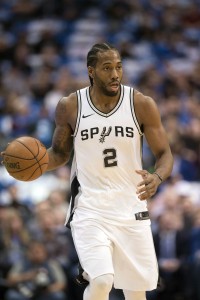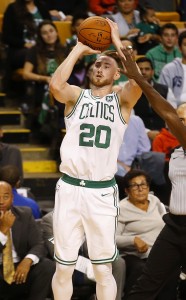Buoyed by savvy free agent signings, last summer’s acquisition of Kyrie Irving, and years of draft picks from 2013’s blockbuster Kevin Garnett/Paul Pierce trade, the Celtics improved their regular-season win total for the fourth consecutive season in 2017/18, coming within one game of an NBA Finals appearance.
The team’s performance was made all the more remarkable by the fact that Gordon Hayward missed the entire season and Irving was unavailable during the playoffs. The absence of the Celtics’ two veteran stars allowed youngsters like Jayson Tatum, Jaylen Brown, and Terry Rozier to take on larger roles than anticipated, and those players thrived with their increased responsibilities.
Now, it will be fascinating to see what the C’s look like when their stars get healthy and those players on rookie contracts enter the season confident in their ability to be impact players.
Here are five key questions facing the franchise this summer:
 1. Will the Celtics make another major trade this offseason?
1. Will the Celtics make another major trade this offseason?
Before acquiring Irving from the Cavaliers last August, the Celtics seemed unwilling to dip into their treasure trove of assets for the league’s top trade candidates, most notably missing out on Paul George earlier that summer. However, the Irving deal showed that Danny Ainge and his front office were ready to pull the trigger when the right opportunity arises.
Unlike in 2016 and 2017, when the Celtics handed out maximum-salary contracts to Horford and Hayward, respectively, they’ll head into the 2018 offseason without any cap room available. That means the trade market represents Boston’s best chance to make another major splash.
The Celtics still have a ton of trade assets available, including future first-round picks from the Kings, Grizzlies, and Clippers, but they can afford to be patient and wait for the right opportunity, since their championship window should remain open for a while.
If Kawhi Leonard becomes available, he’d make sense as a trade target for the Celtics, but putting together a trade package could be tricky. The club doesn’t currently have any players set to earn between $7MM and $20MM in 2018/19, which makes salary-matching a chore. If Boston doesn’t want to part with Irving, Hayward, or Horford, that would mean building an offer using multiple young players, likely including Brown and Rozier.
A package headlined by Brown, Rozier, and the Kings’ 2019 first-round pick (top-1 protected) would probably appeal to the Spurs, but the Celtics would be rolling the dice on a player who is entering a contract year, coming off a major injury, and reportedly has a preference to play on the other side of the country (for the Lakers).
Given how cautious they were when they discussed trade targets like George and Jimmy Butler, I wouldn’t necessarily expect the C’s to go all-in on a risky investment like Leonard. Especially since we still haven’t seen how good the current core can be when everyone’s healthy.
2. Will the Celtics re-sign Marcus Smart?
Of course, that “current core” includes a couple players who will be free agents this summer, with Smart the most notable veteran in that group. While his shooting numbers haven’t improved during his four-year career, Smart is an elite perimeter defender and a culture-setting presence in Boston. His value extends far beyond his box-score numbers, and the Celtics figure to make a strong effort to keep him around.
With three max contracts already on their books and Brown and Tatum in line for massive new deals down the road, the Celtics will be wary of investing too heavily in Smart. Even if they can avoid the tax this season, the C’s will likely become a taxpaying club down the road, so any long-term commitment warrants serious consideration.
A $10-12MM annual salary for Smart would likely appeal to the Celtics, but the four-year veteran has already said he feels he’s worth more than $12-14MM per year. If another team agrees and signs him to an aggressive offer sheet – say, $60MM over four years – it would be very hard for the C’s to justify matching it.
It’s a good problem to have, but the downside of drafting well and effectively identifying talent is that you can’t necessarily afford to keep everyone. In the coming weeks, Smart may become a casualty of the front office’s success.
3. Will the Celtics extend Terry Rozier?
While Smart’s rookie deal expires this offseason, Rozier remains under contract for one more year, making him eligible for a rookie scale extension as of July 1. Rozier, who emerged as a play-maker and shot-maker in Irving’s absence, has a different skill set than Smart, but the duo’s positional overlap means their futures in Boston may be tied together. If the Celtics invest heavily in Smart, it would reduce the odds of a lucrative long-term deal for Rozier, and vice versa.
With Smart’s future likely to be determined in July, the Celtics can afford to wait on extension talks with Rozier. If Smart re-signs, the team may be more inclined to include Rozier in a trade package for an impact player. If not, those extension negotiations will likely take place before the 2018/19 regular-season opener.
Ultimately, I don’t expect the Celtics and Rozier to come together on an extension agreement this year. That doesn’t mean Rozier’s days in Boston are numbered, but it means that it makes some sense for both sides to take a wait-and-see approach. The Celtics will still have the right of first refusal on Rozier as a restricted free agent in 2019, which is the same year Irving can reach the open market.
4. How will the Celtics address the center position?
While Horford has been a center throughout his 11-year NBA career, Basketball-Reference’s positional data indicates he only played 57% of his minutes at the five in 2017/18. Against certain teams and certain lineups, it made more sense for Horford to play the four, alongside a center like Aron Baynes, Daniel Theis, or Greg Monroe.
Theis has a non-guaranteed minimum salary for 2018/19, and after a strong first season in Boston, it’s a no-brainer to bring him back. However, Baynes and Monroe will both be unrestricted free agents. I don’t expect the Celtics to have much interest in re-signing Monroe, and Baynes might have priced himself out of the team’s range with a strong year — he even flashed outside shooting potential at the end of the season, making 11 of 23 three-pointers in the playoffs.
If Baynes and Monroe don’t return, the Celtics may have to scour the free agent market in search of another bargain at the five after investing approximately $5MM in Baynes and Theis for the 2017/18 season.
One intriguing candidate would be Nerlens Noel, whose stock has taken a hit after underwhelming stints in Philadelphia and Dallas. The former lottery pick is still only 24 years old and has potential that has yet to be unlocked. While Brad Stevens may not be able to turn him into the player he was expected to become out of Kentucky, Noel seems capable of giving the Celtics a solid 20 minutes per game, pairing with Horford to create an imposing defensive duo up front.
If there’s no mutual interest between Noel and the Celtics, Tarik Black, Alex Len, and Kyle O’Quinn are among the other veteran free agents the club could kick the tires on.
5. What will the Celtics do with the No. 27 pick?
While the Celtics have had a ton of draft success in recent years, it’s easier to strike gold with a top-three pick than it is at No. 27. Boston’s scouting department will be put to the test this year as the team looks to add another promising young prospect to its core.
Fortunately for the C’s, the back half of the first round this year looks to be littered with the kind of players the organization loves. This year’s draft class is a deep one, and is heavy on wings.
At No. 27, it’s possible that guys like Troy Brown, Kevin Huerter, Josh Okogie, Dzanan Musa, Chandler Hutchison, Donte DiVincenzo, and Grayson Allen will no longer be available. But even if they aren’t, the Celtics could still have several good options, including Bruce Brown, Jacob Evans, Khyri Thomas,and Melvin Frazier.
Here’s where things currently stand for the Celtics financially:
Guaranteed Salary
- Gordon Hayward ($31,214,295)
- Al Horford ($28,928,710)
- Kyrie Irving ($20,099,189)
- Jayson Tatum ($6,700,800)
- Marcus Morris ($5,375,000)
- Jaylen Brown ($5,169,960)
- Terry Rozier ($3,050,390)
- Guerschon Yabusele ($2,667,600)
- Semi Ojeleye ($901,965) — Partial guarantee. Non-guaranteed portion noted below.1
- Abdel Nader ($450,000) — Partial guarantee. Non-guaranteed portion noted below.2
- Demetrius Jackson ($92,857) — Waived via stretch provision
- Total: $104,650,766
Player Options
- None
Team Options
- None
Non-Guaranteed Salary
- Daniel Theis ($1,378,242)3
- Abdel Nader ($928,242) — Partial guarantee. Guaranteed portion noted above.2
- Semi Ojeleye ($476,277) — Partial guarantee. Guaranteed portion noted above.1
- Total: $2,782,761
Restricted Free Agents
- Marcus Smart ($6,053,719 qualifying offer / $13,614,060 cap hold): Bird rights
- Jonathan Gibson ($1,699,698 qualifying offer / $1,699,698 cap hold): Non-Bird rights
- Total: $15,313,758
Unrestricted Free Agents / Other Cap Holds
- Greg Monroe ($6,000,000): Non-Bird rights
- Aron Baynes ($5,193,600): Non-Bird rights
- No. 27 overall pick ($1,640,266)
- Shane Larkin ($1,499,698): Non-Bird rights
- Total: $14,333,564
Projected Salary Cap: $101,000,000
Projected Cap Room: None
- After carrying cap room and vying for the top free agents during the last couple offseasons, the Celtics head into the summer of 2018 over the cap. Even if they renounce all their free agents, they’d still be over the projected $101MM cap line due to their $104MM+ in guaranteed salaries. With their eight fully guaranteed contracts, plus Theis, Ojeleye, Nader, and the cap hold for their first-round pick, the Celtics’ total team salary increases to $109,073,793.
Footnotes:
- Ojeleye’s salary becomes fully guaranteed after July 15.
- Nader’s salary becomes fully guaranteed after August 1.
- Theis’ salary becomes fully guaranteed after July 10.
Note: Rookie scale cap holds are estimates based on salary cap projections and could increase or decrease depending on where the cap lands.
Salary information from Basketball Insiders was used in the creation of this post. Photos courtesy of USA Today Sports Images.
Addressing the issue of salary matching in any Leonard trade, the Celtics could perform a sign and trade with Marcus Smart if the Spurs are interested. Smart is set to earn between 10-14mil this season
True, though Smart would have to be on board, and the Base Year Compensation rule could complicate matters somewhat (briefly: if Smart got $14MM, he’d count for $14MM from the Spurs’ perspective, but only 50% of that ($7MM) from the Celtics’ perspective, for salary-matching purposes).
Would Smart, Morris, and Yabusele work for salary? Add in a first, maybe two if one is a Celtics first, and that could work for everyone involved.
I think Smart would have to get a little more than $14MM for that to work, and Kawhi would have to waive his trade kicker (another complicating factor!). It’s close though. Throwing in Nader and/or Ojeleye could also help.
For sure Boston has done very well drafting the last few years, but as the article said not too difficult when you pick so high, now will see how good can they be picking low, intriguing.
It’s still pretty difficult to pick when you’re that high… Brown was part of a consensus 3-8 where any of the 6 guys could’ve gone anywhere in that range, and he picked Tatum over Fultz and traded down to boot.
Also they previously picked Rondo and Bradley down low, but they also picked Olynyk, Sullinger, and Fab Melo just off the top of my head, so it’s always a crapshoot out of the top 10.